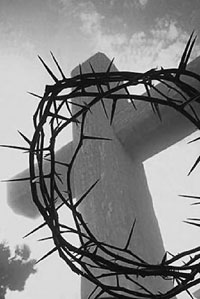| |
‘Elijah . . .
went a day’s journey into the desert. He came to
a broom tree, sat down under it and prayed that
he might die. ‘I have had enough, Lord’, he
said. ‘Take my life. I am no better than my
ancestors.’
(1 Kings 19:4) |
|
How alone Elijah felt as
he pursued his headlong flight into the desert. We find
him, slumped beneath a tree in the desert, a despairing
prayer on his lips.
Behind his cry, a fierce spiritual
battle was raging.
The powers of darkness were closing
in, assailing the battered prophet with lies and
self-accusations, until he succumbed to the hammer blows
of Satan’s attacks and ended up believing something that
was not true: namely, that he was worse than he really
was.
What was behind
Elijah’s desire to run away? |

Morguefile
|
It was
certainly not being on his own that was the problem, for
we have seen already how wonderfully at home Elijah
could be in the presence of the Lord. No, it was his
motivation that had collapsed.
Elijah was suffering from a combination of exhaustion,
despair and condemnation – that terrible condition which
plagues the majority of Christians at some time or
another, and which makes us feel an outsider to God’s
goodness.
So long as Elijah had looked at the Lord, he had
triumphed over impossible situations and fearsome odds.
As soon as he looked at his own peril, however, he found
himself unable to respond to this latest threat against
his life.
The Cost of Taking a Stand
The love of God had constrained Elijah to go and
confront Ahab, but there is a price to pay once we begin
challenging vested interests and evil strongholds. To
plead for causes that are too righteous to be popular,
to tell a compromised Church that it is corrupt, and to
strive to awaken slumbering consciences has always been
the prophet’s arduous task. Anyone whose duty has led
him to challenge prevailing opinion will know the
anguish of such isolation – but they also know that it
would be quite wrong not to take such a stand.(1)
What breakthroughs of God’s Spirit might never have
occurred if the apostles had not withstood the
Sanhedrin, if John Wycliffe and William Tyndale had not
pursued God’s plan to translate the Bible into English,
if Martin Luther had not defied the Pope, and if John
Wesley had not ‘consented to be more vile’ and preach
the gospel in the open air?
It is not uncommon for pioneers of faith to feel
forsaken at their time of greatest need. Our Lord
Himself was treated thus. One plus God is still a
majority, but we may still face times when we feel
overwhelmed by circumstances. Even Moses lost his cool
at one point and smashed the stone tablets of the law.
So too did David, when, in a moment of rank despair, he
ran away to join the Philistine army.(2)
The Prophet’s Despair
Despite the victory on Mount Carmel, it felt to
Elijah as though nothing had changed. The people may
have witnessed the power of God, but they were by no
means converted. As for Jezebel, she still sat securely
on her throne. Why had God hinted at so much, but
accomplished so little? The powers of darkness crowded
in, eager to convince the exhausted prophet that all his
efforts had been in vain.
As all hope of accomplishing anything useful withered in
Elijah’s heart, it seemed to him that he was no better
than his ancestors. For one terrible moment he found
himself forced to consider the unthinkable: that he had
been mistaken all along in believing that he had been
chosen for the task of drawing the nation back to God.
In the agony of that tortured awareness, a dark cloud of
despair settled on him, in which the past appeared to
have been wasted, the present unbearable, and the future
too bleak to contemplate. Elijah cried out that he might
be allowed to die.
|
 |
It is not so unusual as one might imagine to come across
a Jeremiah cursing the day that he was born, or an
Elijah asking to be allowed to die. Extreme pressure
often has the effect of making burden-bearers to want to
quit. We must be careful. If we do not resist the
temptation to despair, we risk opening our hearts to
negative forces, which will sweep in and plunge the soul
into bitterness, and even cynicism. (A simple test of
our heart’s condition is to see whether our spirits
still kindle at the sight of others being blessed. If
they do not, there is something seriously wrong).
| Hope is such a psychological necessity that, without it,
the best of us are vulnerable to the scourges of fear
and anxiety. Georges Bernanos and other Catholic writers
claim that despair is the most insidious of all
temptations. This is because the powers of darkness try
hard to hide the fact that it is a temptation at all.
How clever they are at making our despondency appear a
natural response to the dilemmas that we face. How
diligent they are in masking the ways in which God has
led and blessed us in the past. How easily they shift
our focus from the vision God has given to our own
lamentable condition. How important it is to remember
that we worship a God of hope, and that hope does not
disappoint us!(3) |

|
Overcoming the Sense of Failure
As we have seen, behind Elijah’s despair lay a
crippling sense of failure. To feel that we have failed
is one of the most disorientating of all emotions. Fear
of failure stalks our nation, hinders creativity and
pressurizes people into ways of living that are at
variance with all they really want to do. But the man
who has made no mistakes, however, has in all
probability, done nothing worthwhile.
There is another sense in which the Lord can only truly
use those who have come to thoroughly mistrust
themselves. A Spanish proverb reminds us, ‘He is
always right who suspects that he makes mistakes.’
Oliver Cromwell put the same point yet more strongly
when he said: ‘I beseech you, in the bowels of
Christ, to think it possible you may be mistaken.‘
Such humility leads us away from despair, and into
patterns of godly repentance. It also represents an
important counterbalance to the more strident forms of
triumphalism.
The Battle is the Lord’s
Perhaps it is only those who have shared the same
spiritual burdens as Elijah who can understand the
weight of the dejection he felt at this time. Certain
types of despondency are more difficult for the saint to
bear than the sinner. Whereas those whose hearts have
been touched by the Lord feel acutely the pain of
individuals, nations or churches which are going astray,
the vain occupy and torment themselves with many matters
of no consequence.(4)
 |
We must be careful not to make glib judgements about
those who have borne much greater strains than
ourselves. As an old Red Indian proverb puts it,
‘Help me never to judge another until I have walked for
two weeks in his moccasins!‘
Given the circumstances, it is easy to identify with
Elijah’s prayer. It is only fanatics, and the untested,
who have never had to wrestle with a sense of their own
dejection, as they measure the size of the task ahead
with their pathetically inadequate resources.
|
Nevertheless, it can
never be a proper response, for it is tantamount to
accepting Satan’s assessment of the situation that we
face. Surely the Lord, who had provided for His servant
time and again in the past, could find a new way to do
so now?
The battle is the Lord’s, but we still need a heart for
the fight. If there is one thing certain, it is that
when we set out in faith to fulfil a mission for the
Lord, there will always be a host of inner doubts to
overcome, and people to tell us that we are attempting
the impossible!
Again and again we will have to resist the pressure that
fear places us under. Courage has nothing to do with not
being afraid, but everything to do with being willing to
go forward in spite of our fear. Courage is thus almost
a contradiction in terms. It is, as G.K. Chesterton put
it, ‘a strong desire to live, taking the form of a
readiness to die.’ Lord, fill us with Your courage,
and help us to keep our eyes stayed on You!
Overcoming Giant Despair
There was a time when the entire Israelite army was
reduced to paralysis by the sound of Goliath’s challenge
and the size of the giant’s shoulders. Similar
temptations to despair afflict many in the body of
Christ today. Many of us will know what it is like to
experience a particular ‘giant’ stepping forward every
time we seek to take a step of faith for the Lord. Its
taunts are deep and threatening. ‘You’ll never be
able to do that; you’ll be left high and dry . . . Who
do you think you are?‘
Fuelled by a low self-esteem, and reinforced by outward
setbacks and disappointments, the temptation to despair
becomes embedded in our minds, as tedious refrains
torment us. ‘If people knew what I was really like,
they wouldn’t love me . . . God can’t use me, I’m not
even sure that He hears my prayers . . .’ These are
immensely private battles, and ones which nobody else
can initiate for us. But they must be fought and won.
It would have been tragic beyond words if the Lord had
granted Elijah’s impetuous request and allowed him to
perish in the desert in an unmarked grave. After all,
much of his most far-reaching ministry still lay ahead
of him – not to mention his friendship with Elisha, and
all that came from that.
There will always be temptations to retreat from our
calling. Satan is forever angling for us to yield to a
sort of pact of non-aggression. His unstated offer – I
won’t hurt you, if you won’t hurt me – designed to make
us feel that the cost of our pilgrimage is too high, and
hence to make us willing to settle for a less vigorous
discipleship.
 |
Our task is to respond with faith, and so disappoint his
expectations.
For while the negatively-minded see the
potential for disaster in each difficulty that they
face, the creatively courageous press in to see the Lord
bring about new triumphs from the very same
circumstances.
Like a rose among thorns, fresh
opportunities to prove the Lord’s faithfulness lie
hidden within every one of our dilemmas. |
As always, our perspective is crucial. A tightrope
walker fixes his gaze on some object far ahead to keep
him steady. What he never does is to look down, or
around. The Greek of Hebrews 12:2 provides the clue when
it speaks of ‘looking away unto Jesus.’
Mourning into Joy
It takes courage to keep trusting and praising the
Lord when some longed-for door closes in our face. Not
every legitimate hope that we harbour will come to
fruition, or, at least, not immediately. Neither will we
be spared the pain of having to contend with unexpected
and painful disappointments along the way. Yet God can
turn around for good even the attacks which men and
Satan intended for evil as we continue to trust Him.
How else can we interpret the shocking decision Joseph’s
brothers made to rid themselves of their boastful
brother? Yet God used even this act of callous treachery
in the long run to save the nation. Joseph was later
able to recognise that it had been God, and not his
brothers, who had delivered him to Egypt – and for the
all important reason of preparing for the forthcoming
famine.(5) Is not this dramatic change of fortunes a
foreshadowing of the greatest reversal of all time, when
the finest man who has ever lived was put to death on a
Cross?
If God was able to turn the ultimate injustice
round to be the final victory of all, is He not able to
handle our relatively trifling setbacks? |
 |
Don’t Give Up!
Could we but discern it, our temptations to despair
are often only wounded vanity. We feel dejected less
because we have hurt the Lord than because we have
failed to live up to our mistakenly high standards of
what we thought we could do (or be) for Him.
While it is right to have a deep horror of sin, it is
better to have a still greater love of good. The Lord
admires us more for having tried to do something for
Him, and perhaps having failed in the attempt, than if
we had attempted nothing through fear of getting it
wrong.
That is not to say we will necessarily be spared all the
consequences of our sins and stupidities. Many of us may
still have to live with the after-effects of the rash
things we have said or done. Yet we can take heart from
the example of Elijah. There would still be much
fruitful service ahead for him, just as there was for
David after his lapse with Bathsheba.
God is merciful but not indulgent. The baby Bathsheba
bore died at birth. Had David been let off more lightly,
the lesson would not have been scored deeply enough into
his heart. As it was, the severity of his chastisement
deterred him from ever again abusing his exalted
position. But how futile it would have been if David had
ended his days in endless remorse because of what he had
done!
More people fail because they give up trying, than as
the result of some actual failure. If we nurse a sense
of guilt and failure, it not only makes it impossible
for us to accept God’s loving forgiveness: we are
effectively implying that our wretchedness is greater
than His never-ending love!
As Selwyn Hughes puts it, ‘The Lord Jesus is not
against us for our sins, He is for us against our sins‘.
It is dishonouring if we believe anything less. We are
well on the way to being truly humble if we can repent
of our stupidity, but still enjoy boundless confidence
in God’s forgiveness. Christ does not love us
grudgingly, as if with gritted teeth. He is our
Companion, who longs to show us the best path to follow.
Every day is a fresh page that is waiting to be written
– a brand new opportunity to live with God. We never
know what He is going to do next!
The Antidote to Despair
Winning battles of faith against despair not only
brings to nought the gloomy predictions of Giant
Despair, but also opens up whole new horizons for us.
That does not mean that we may not lose some rounds on
the way. Elijah himself had been fighting too many
battles on too many fronts, and was, in consequence,
physically and spiritually drained. Perhaps he was also
suffering the haunting fear of being let down by God.
His feelings can be summed up in an agonised question:
‘What’s the use of going on, Lord, if You’re not with
me?’
Superficially, Elijah’s plight appears to resemble that
of Jonah, who also sat down under a broom tree and
wished aloud that he might die. But there the
similarities between the two prophets end. Elijah fled
when his life really was in danger, having completed the
greater part of the work God had called him to do. By
contrast, Jonah did his utmost to avoid even starting on
his mission.
| |
Moses once prayed in a time of great despair,
‘If
Your presence does not go up with us,
do not send us up
from here.
How will anyone know
that You are pleased
with me
and with Your people
unless You go with us?‘
|
|
It was genuine anguish, not whingeing selfishness, that
had made Moses cry out to God. Like Elijah, Moses had
travailed too long in the heat of the day. Both had felt
acutely that their mission was beyond their powers to
accomplish. To Moses, God had shown Himself supremely
merciful, giving him a wonderful promise: ‘My
Presence will go with you and I will give you rest.’
(6) Then, as hope rekindled in Moses’ heart, he became
still bolder, even going so far as to ask to be allowed
to see the glory of God. This too the Lord permitted.(7)
Most people have heard of the Hebrew word ‘ruach’ (the
‘breath, wind or Spirit’ of God). Fewer will be familiar
with ‘nu’ach,’ a verb that occurs on more than twenty
occasions in the Bible. It means to rest or settle down,
to be soothed or quieted; to be secure, to be still, and
to dwell peacefully. God was promising to soothe and
comfort His troubled servant with the restfulness of His
presence. The Spirit of God delights to draw us closer
to our heavenly homeland as we pray for His ‘ruach’ to
‘nuach’ (settle deeply) on us.
Elijah had been through a painful and protracted time of
turmoil, and the Lord, in His kindness, granted Elijah a
further period in the wilderness to help him recover
from his intense ordeal. In Isaiah 28:12 the Lord
presents His people with a wonderful offer: ‘This is
the resting-place, let the weary rest,’ and ‘This
is the place of repose.’
The word used here, menuchah, is a derivative of nuach.
It is the word used in Psalm 23:2: ‘He leads me by
the waters of menuchah.’ It is a yet stronger
exhortation to come to a place of quietness and
consolation.
The Lord’s Refreshing
When the battery of our camcorder runs out, it needs
to be fully discharged, a stage known as ‘refreshing’.
Only when this process is complete does the actual
process of recharging begin.
There are parallels here in
the way the Lord refreshes us beside still waters. At
the end of the forty days, however, Elijah was
‘discharged’ rather than ‘recharged’.
We find him
curling up in a cave – a fitting place, one feels, for a
man who had wanted to escape from everything and
everyone. |
 |
For us, too, the Lord may permit all manner of obstacles
to come our way before His work of refreshing is
complete. When He resolves them, in His own inimitable
way, we have the joy of knowing that only the Lord could
have brought about the victory.
We can be at peace, therefore, concerning our many
present difficulties. The Lord will solve each one in
its turn, provided we do not allow the terror of Jezebel
to fill our minds and quench our faith. We are so quick
to assume the worst, and to suppose that the Lord has
deserted us. The reality is quite different: our labour
is far from being in vain.
We shall have more to say on overcoming despair in the
chapter ‘Confronted with God’s Challenge.’ In the
meantime, the answer to our feelings of despair lies in
what has been called ‘The Sacrament of The Present’.
If we can leave the past to God’s infinite mercy,
commit the present to His grace, and entrust the future
to His boundless providence, there will be far fewer
landing strips for discouragement.
The more we give
thanks to the Lord in all circumstances, the more we
will experience His joy flooding in to refresh our soul. |
 |
Reflections
The Lord had asked Elijah a searching question.
‘What are you doing here?’ The implication is
clear. ‘Why are you so far from your post?’ The
question may be a relevant one for us, too, when despair
seizes hold of us. Let us spend a few moments with Him
now and ask Him if there is anything the Lord would say
to us concerning the way we handle our times of crisis.
Have we responded to our own difficulties with faith, or
been dominated by our fears? Were we really called to be
involved with that particular situation which so wore us
out? Have we learnt to recognise the danger signals that
indicate when our energy levels are depleted, and taken
quality time off to compensate?
Selah
Lord, I recognise the devil’s tactics for what they
are – a desperate attempt to make me give up before Your
victory comes. I acknowledge that my work would be
unfulfilled were it to end right now, and I declare that
You will yet fulfil all You have in mind for me to do.
Heal my hurts and confusions, increase my determination
to trust You, and overcome my tendency to despair. I ask
that the wind of Your Ruach-Spirit may blow now through
my life, to bring me to a deeper place of nu’ach-rest,
so that I may serve You from a place of peace. In Jesus’
Name, Amen.
|
|

